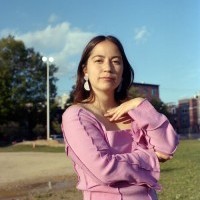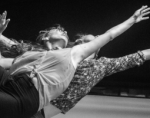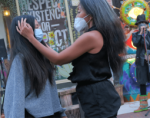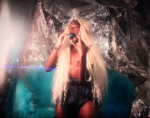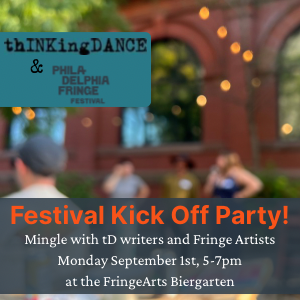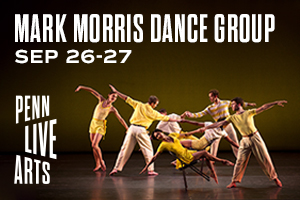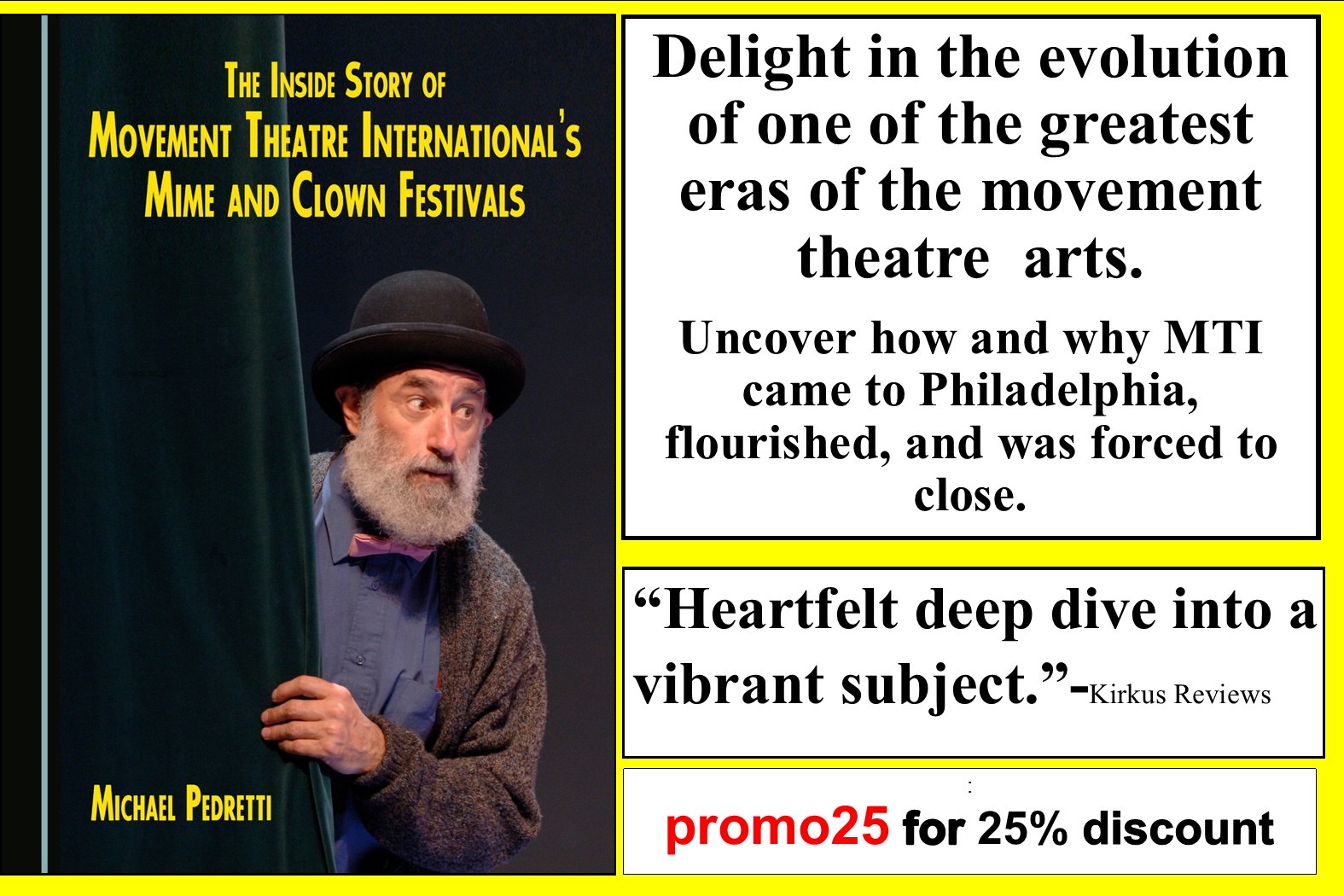
Femininity and Hip Hop: An Interview with Lily Frias of Femme Fatale
by Maddie Hopfield
Lily Frias is a Mexico-born, Los Angeles-based dancer who specializes in popping and whacking. Among her many accomplishments as a professional performer, dance teacher, competitor, judge, and choreographer are her features on “America’s Best Dance Crew” Season 7 and “So You Think You Can Dance” Season 12, where she competed as the first Mexican to appear on each show. More recently, along with collaborators Dassy Lee and Marie Poppins, she formed Femme Fatale, a performance crew rooted in hip hop styles like whacking, popping, and animation, with an interest in explorations of feminine power.
Pre-pandemic, Lily Kind, associate director of Urban Movement Arts, was hoping to bring Frias to Philadelphia for a popping workshop. Femme Fatale also had a new piece set to premier at the Hit the Floor tour in Canada. With these events postponed, she is teaching private and group classes, as well as hosting virtual practice sessions, on Zoom. Her pre-recorded classes are also available online through Steezy Studios. I called Frias in LA to discuss her dance journey, the formation of Femme Fatale, and how she’s continuing to dance and find community during quarantine.
Maddie Hopfield: Do you consider popping to be your main style or specialty?
Lily Frias: I’ve definitely been focusing on and teaching popping and whacking these past couple of years. In battles this is usually what I tend to do. But I take everything: locking, house, hip hop, lightfeet, vogue, like, I just love everything.
MH: It can be difficult for new hip hop dancers (like myself) who want to do ‘everything.’ But if you look at the people you admire who are actually experts in a style, they’re really committed to one thing. You’re an interesting artist because you’re blending a lot of different things on your Instagram and in your freestyles.
LF: Thanks! Yeah, practicing other styles… for example, I love house. I practice to house music all the time. I go to house parties all the time, or if a house DJ is playing I’ll go because the community is so open and the music is so open. I think practicing to different types of music gives different dynamics and freedom to what you can create.
But it’s a balance. You can experiment a lot, but then there are times that I’m like, okay, you need to practice your foundation. It’s about finding that happy medium, and also not necessarily mixing, but adding one move or incorporating a concept that you learned somewhere else. It’s also about the transitions, the finesse. How can you make it seamless? How is one round not going to be a mix of a thousand different things but a flow? It can’t be that I’m entering doing popping and all of a sudden I change to something else, and then I do a flip. I feel like if you find the flow and the way of mixing in those transitions and make it smooth and with the music, then I feel like you can be free. You’ve still gotta do you to win. You don’t want to look like everybody else.
MH: You were on “So You Think You Can Dance.” What was it like?
It was a really, really crazy experience. For me, it was huge because even in Mexico everybody in my studio, all of my friends, we all looked up to this TV show and looked up to all of these dancers. It was huge. It was unreachable. I really felt the pressure of, oh my god, I gotta represent.
I’m from such a small city in Mexico so for me it was crazy to see my family in the audience. My parents even cried when I got eliminated. Being the first and only Mexican that’s been on this show, to me, that’s huge and I really hope that I inspired other dancers from Mexico and Latin America to be like, well, if she can do it then so can I.
MH: You started Femme Fatale with Dassy Lee from Korea and Marie Poppins from France. It’s interesting because the three of you are from different countries, and have your own dance backgrounds. How did you decide to work together?
LF: Marie I met in Mexico because we did a crew class. Then Dassy I heard of through the popping community in New York. We all met up in LA. Marie got invited to showcase one of her pieces at this festival in Sweden called Dance Delight; she invited us to join and we were like, okay, let’s do it. It was out of nowhere, and our first time with the three of us dancing together. It was literally in our living rooms where we created our first piece.
We ended up winning Dance Delight and got a pass to the finals in Japan. Everybody kept telling us, “You guys have something special, so don’t let that go.” And we felt that too. I felt that we all had that same drive to create, and we just genuinely love dancing together. We thought, let’s name this Femme Fatale and do this for real. It’s been really, really gratifying as a dancer to find people who want you to be a better dancer and an entrepreneur.
MH: In your work together there’s a lot of exploration of masculine and feminine concepts. In the hip hop world, popping for example is a style that is...
LF: Male dominated.
MH: So, I want to hear more about the role that womanhood or femininity plays.
LF: With us, we’ve really embraced whatever feeling we have as women. You’re expected to look a certain way or dress a certain way or try to be more masculine to get more validation. But I don’t think there’s a definition of what a female should look like. You can embrace every way of expressing your femininity. Like, if it’s in a really sexy way, if your technique is fire, you could be out there in a bikini and I would live for it, you know? I don’t think that takes away at all the investment and the dedication and the knowledge and the dance. It’s just a different way of expressing it.
We often feel like we need validation from men, or from the community, but if you’re dedicated and you’ve paid your dues and you're consistently growing and you know the history and the technique then why not explore different ways of popping. We really try to make it for everybody. For us it’s been really cool exploring because we all look different: Dassy’s from Korea, Marie’s this tall, white French lady, I’m very much Mexican.
MH: As an independent artist and professional dancer what do you want to say in this pandemic?
LF: Well, I definitely feel like we’re all experiencing this in different ways. I know as artists we’re so connected to other humans. At least for me I know I miss being in the cypher, being at a party dancing around people, just vibing and getting that energy that you get in a class or just exchanging with somebody. The intangible magic of dance has paused during this time. But it’s also about finding other ways to connect.
It has been really cool to see people teaching online or training online. It’s definitely a different experience but I’m really trying to embrace that part, too, and embrace how we can connect with people all over the world. Maybe somebody from India is taking my class, somebody from Sydney, somebody from Argentina. We’re all just seeking that connection.
It’s also necessary when we take donation-based or free classes, to support all of us. I always like to donate to the teacher, even if it’s a little bit. Because it is a full circle. They’re giving their knowledge, their time, and we’re all in this together. If they make money I make money.
And finding other ways that we can be creative: training in different ways, creating in new ways, seeing yourself on camera. What can I fix? I think as artists we always find a way. I think any artist—like a musician, painter, dancer, we just love what we do so much that we will always find a way.
You can hear more about Lily’s classes and work on her Instagram (@lilyfdc), Facebook, or on Youtube.
Interview with Lily Frias of Femme Fatale, conducted via phone, April 6.
By Maddie Hopfield
May 11, 2020

